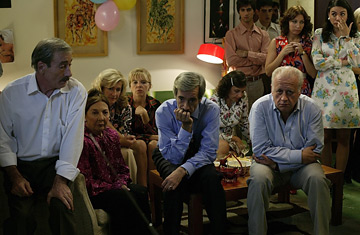
Mercedes (Ana Duato, third from left) and Antonio Alcántara (Imanol Arias, fifth from left) watch news of Franco's illness with their neighbors.
(2 of 2)
Recently, this willful collective amnesia has begun to lift. A slew of books and movies document everything from the plight of Spanish children shipped off to Russia or Mexico during the civil war, to the persecution of homosexuals under the Franco regime. Volunteer organizations like the Association for the Recovery of Historical Memory spend their weekends unearthing mass graves of Loyalists killed for supporting Franco's enemies, and the descendants of political opponents convicted under Franco have appealed their relatives' sentences. Most important, the Spanish parliament recently passed its long-awaited Law of Historical Memory, which, among other things, makes reparations to the dictatorship's victims.
Cuéntame has played a role in this process of remembering. "Without a doubt, we've helped Spaniards recover the memory of that time," says writer Ladrón. "We were the first TV program to show what life under the dictatorship was like." Paloma Aguilar, author of Memory and Amnesia and professor at Spain's UNED University, agrees. "In its early years, the show presented a fine portrait of social Francoism. Of a time when most middle-class families were just trying to get ahead. Audiences loved it because they recognized themselves in it." Actress Duato, who plays Mercedes, identifies another reason for the program's success: "It gathers the family around the TV to talk about our shared past."
But if the show has reminded Spaniards of the grand atrocities and quotidian hardships of the era, it has also sparked fonder memories. The peppy rock and roll of the era, the Seat 600 (a tin box of a car that was many Spaniards' first automobile), the neighborhood bar where the men of the barrio gathered daily — all feature prominently. So too does the grandmother who lives with the family; the Alcántaras may struggle to attain middle-class comforts — they line up outside the bathroom Saturday nights for the week's one bath — but they enjoy a closeness that few of today's busy, two-career Spanish families achieve. "What people like about this series is the sense of traditional honor and values," says producer Bernardeau. "People in Spain don't have the same sense of conscience any more, their word isn't worth what it once was."
In this nostalgia, Cuéntame reflects the complicated feelings that Spaniards have long carried about their recent past. For those old enough to remember the era, criticism of the dictatorship is blurred by memories of a time when life was in many ways simpler. "The more independent we've become, the less happy we are," says Bernardeau. "We were happier when we had less. Now we're fully Europeans, but we've lost something."
In its first seasons, the nostalgic tone opened the show to criticism. "Because the program didn't show the family fighting against the dictatorship, a big part of the cultural elite and the leftist sectors of society hated it. They saw it as almost a defense of Francoism," says Aguilar. Since then, however, Cuéntame has perhaps swung the other way, with son Toni working secretly in the underground resistance, hippie daughter Inés married to a former priest, and even young Carlitos swept up in suspected political plots. "Spanish society is now more openly sympathetic to criticism of the dictatorship, and the show is as well," notes Aguilar. "But it's hard to say whether changes in society influenced the show, or the show influenced changes in society. Probably they influenced each other, though in its ideological evolution, the show has also become more politically correct."
When Bernardeau sold the show to RTVE, open discussion of the Franco era was still rare enough that his friends promised they'd throw him a party if Cuéntame ever made it to the dictator's death. Now those episodes are scheduled to air in the coming weeks, and the program has a new contract that takes the Alcántaras through the early years of the Transition, to 1979. Bernardeau will get his party, and Spaniards — be they political leaders or couch potatoes — can observe the anniversary of the dictator's death more openly than ever before.
